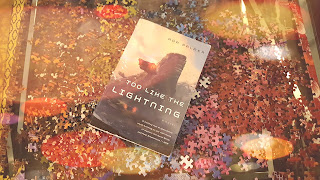Too Like the Lightning, by Ada Palmer
There's a distinct thrill to reading science fiction, a kind of adrenaline burst that occurs when you only sort of understand what's going on but want to keep putting puzzle pieces together until you figure it out. Ada Palmer's 24th Century Earth looks almost nothing like our own, yet enough is familiar that we are simply as travelers in a foreign land: the ingredients are the same, but the meal is a novel wonder.
And this novel is such a wonder. Though written in a style reminiscent of the 19th Century, the world our somewhat unreliable narrator describes holds no relation to that time other than an appreciation for its academic and philosophical works. There are no longer geopolitical nation states, rather the world divides itself into seven Hives, which people join as they come of age and decide which Hive's values they feel most comfortable with. Families are not nuclear, but similarly sort themselves into a bash', a family group of any number of couples and children who are raised together even when not biologically related. It's possible to have different Hives in one bash', though this is not the case with our closely regarded example, the Saneer-Weeksbooth bash'. All its members are Humanists, and the family holds the incredibly important job (indeed, it's impossible to overstate its importance) of running the flying cars in which six of the seven Hives transport themselves and goods. Into the the outskirts of this bash' is dropped Bridger, a miracle child, and Mycroft, our narrator, serving time for a crime so horrible his very name is practically anathema.
Gendered language and dress are a thing of the past, and it is forbidden to speak about religion with three or more people. These two traits, along with the political and familial arrangements, provide the basis of our story. It takes a while to get used to it, but Palmer's clever device of having Mycroft write his tale as if for a future historian looking to gain insight upon a distant time allows for explanation where needed. Palmer is both philosopher and storyteller, using each to inform the other so that this work is both an enthralling story and an introduction to the thought of the Enlightenment. I'm again reminded a little of Dune and my recent reading of The Traitor Baru Cormorant; there's too little really smart sci fi, and this is a welcome entry into that subgenre. I can't wait to read the second book of this planned trilogy.
And this novel is such a wonder. Though written in a style reminiscent of the 19th Century, the world our somewhat unreliable narrator describes holds no relation to that time other than an appreciation for its academic and philosophical works. There are no longer geopolitical nation states, rather the world divides itself into seven Hives, which people join as they come of age and decide which Hive's values they feel most comfortable with. Families are not nuclear, but similarly sort themselves into a bash', a family group of any number of couples and children who are raised together even when not biologically related. It's possible to have different Hives in one bash', though this is not the case with our closely regarded example, the Saneer-Weeksbooth bash'. All its members are Humanists, and the family holds the incredibly important job (indeed, it's impossible to overstate its importance) of running the flying cars in which six of the seven Hives transport themselves and goods. Into the the outskirts of this bash' is dropped Bridger, a miracle child, and Mycroft, our narrator, serving time for a crime so horrible his very name is practically anathema.
Gendered language and dress are a thing of the past, and it is forbidden to speak about religion with three or more people. These two traits, along with the political and familial arrangements, provide the basis of our story. It takes a while to get used to it, but Palmer's clever device of having Mycroft write his tale as if for a future historian looking to gain insight upon a distant time allows for explanation where needed. Palmer is both philosopher and storyteller, using each to inform the other so that this work is both an enthralling story and an introduction to the thought of the Enlightenment. I'm again reminded a little of Dune and my recent reading of The Traitor Baru Cormorant; there's too little really smart sci fi, and this is a welcome entry into that subgenre. I can't wait to read the second book of this planned trilogy.


Comments
Post a Comment